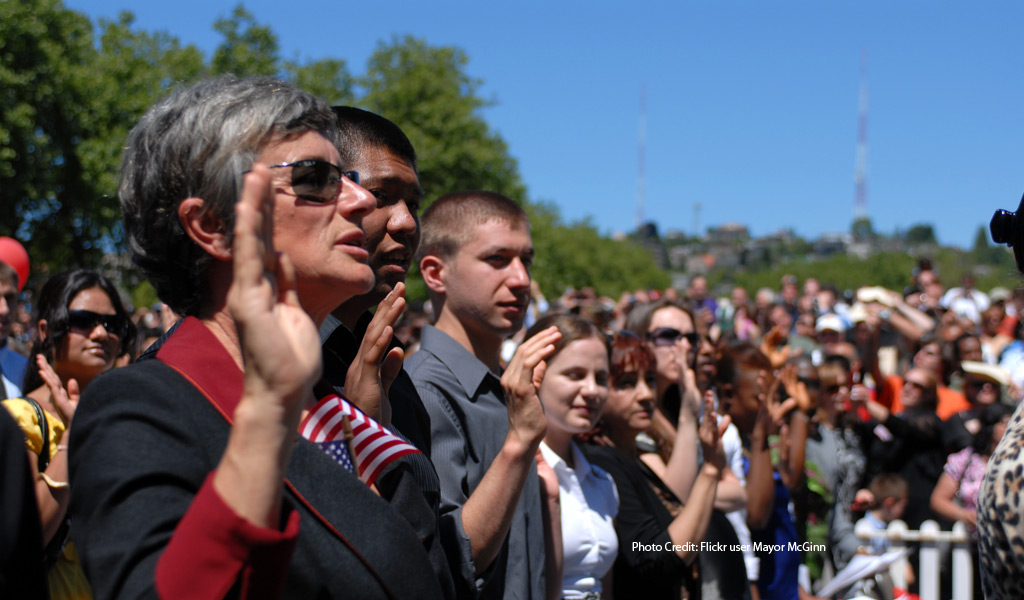
Engaging in America: Knight helps green card holders become citizens
Knight Foundation supports informed and engaged communities, but the full promise – and responsibility – of engagement cannot be realized without citizenship. For that reason, Knight is proud to announce its support for an exceptional collaboration of more than 80 foundations, legal service providers, businesses, faith-based organizations, and community leaders to modernize the naturalization process and help legal permanent immigrants become U.S. citizens.
Knight has committed $3.7 million to the New Americans Campaign, a non-partisan, $20 million campaign that is also sponsored by The Carnegie Corporation of New York, The Evelyn and Walter Haas, Jr. Fund, Grove Foundation, Open Society Foundations and The JPB Foundation. After a pilot year, it launches this week, focusing on cities across the country with large populations of citizenship-eligible residents.
Nobody can be more fully engaged than a citizen and so, years ago, we decided to focus our work in immigration on the creation of, and engagement of citizens. Fair and effective immigration policy is not likely to come out of a national shouting match. Instead, we believe that a conversation among citizens will clarify our collective goals. Knight does not have a formula or program to propose, but we believe that the best way to determine the way forward in immigration policy is through civil conversations that can be best and most effectively informed by the engagement of natural-born and newly sworn citizens alike.
More than just increase the numbers of New Americans, Knight’s goal is to fundamentally change how the system of naturalization assistance works, through more innovation and more collaboration among the non-profits, businesses and other organizations that help legally qualified residents make it through the journey of citizenship. For instance, the campaign supports new online platforms, such as CitizenshipWorks, to enable service providers to guide greater numbers of people through the citizenship application process. The program also makes conducting workshops in different languages easier and more efficient. We are seeking to provide grassroots community organizations with the resources to enable them to experiment with new digital models and partnering with businesses to provide services. Other innovations involve electronic tools to support applicants studying for citizenship tests, such as MP3 players with civics-exam questions, vocabulary exercises and mock interviews. This is a non-partisan effort: Two former commissioners of the agency overseeing immigration are supporting the effort. Doris Meissner was INS Commissioner under President Bill Clinton; James W. Ziglar served in the same role (for the agency by then renamed USCIS) under President George W. Bush; together they will form a bipartisan advisory committee to underscore the vital role that citizenship plays in strengthening American society. Meissner and Ziglar are senior fellows at the Migration Policy Institute, a nonpartisan immigration policy think tank in Washington, D.C. Eight million people currently qualify for citizenship as legal residents, based on their “green card” status, which allows them to live and work in the U.S. on a permanent basis. Yet, only eight percent of them become citizens each year. They face a range of barriers, including high application fees and a complex citizenship process that can take up to two years to complete. Many also fall victim to unscrupulous attorneys and notaries who take advantage of individuals seeking legal assistance. The New Americans Campaign is trying to address these challenges. We hope to demonstrate the campaign’s collaborative and innovative approach to naturalization assistance with at least 60,000 successful applications. We want to help evolve how the system of naturalization works; and we hope that this systemic approach will take root and thereby integrate a far larger number of legal immigrants in the decades to come.
By Damian Thorman, national program director at Knight Foundation
Related: “Campaign Begins to Help Legal Immigrants Become U.S. Citizens” in the Chronicle of Philanthropy”
Recent Content
-
Community Impactarticle ·
-
Community Impactarticle ·
-
Community Impactarticle ·


